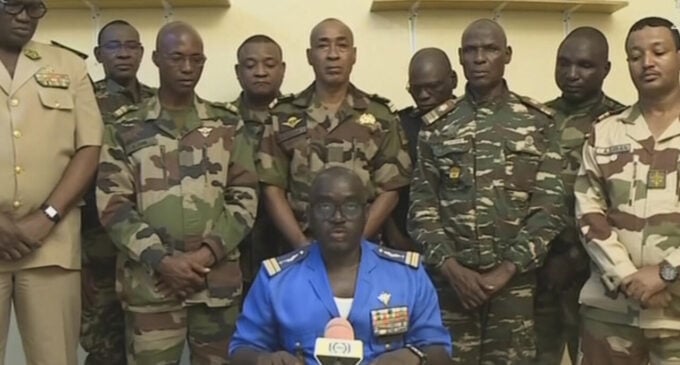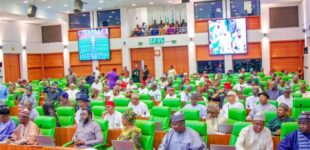Niger: A caution for the coup apologists

BY AHMAD DANYARO
In a world increasingly divided, the discourse on any societal or national concern is a crowded arena where supporters and opponents converge with equal fervour. However, amid this cacophony of opinions, it is imperative to reflect on the potential chaos looming over West Africa if the unsettling trend of coup d’états, epitomised by recent events in Niger, remains unchecked by resolute opposition from ECOWAS and other concerned stakeholders.
History’s lessons, though swiftly forgotten, serve as a stark reminder of the atrocities inflicted upon the West African region under military rule. The journey to democracy in most countries was paved with sacrifice, marked by the blood, sweat, and tears of citizens who dared to challenge the tyranny of military regimes.
From Sierra Leone to Liberia, from Guinea to the Gambia, and Nigeria, the toll exerted by these coups has been counted in thousands of lives lost. The brutal suppression of pro-democracy protests by the Guinean Junta and Nigeria’s tumultuous decades of successive coup d’états had thwarted the establishment of robust rule of law and policy frameworks essential for economic prosperity.
Even smaller nations like Liberia and Sierra Leone were not spared the grip of military rule’s adverse effects. These nations sacrificed thousands of lives and squandered precious decades that could have been directed towards realising lofty economic visions within otherwise stable societies.
While coups might promise fleeting relief, the reality in almost every coup-infested nation reveals a different story. The reason is evident: prosperity thrives on the foundation of culture, order, and established patterns, attributes fundamentally absent in the DNA of military governance.
Soldiers are trained to defend nations against insurrection and external threats, yet prolonged leadership often skews their role into uncharted territory that leads to unintended consequences.
Despite arguments suggesting that people yearn for good governance, food security, and protection of lives, proponents of military rule overlook a critical aspect. While coup leaders may articulate lofty goals, their lack of practical understanding becomes evident when it comes to implementation. Copious evidence throughout West Africa’s post-colonial history reveals this dissonance.
In their attempts to conceal incompetence, coup leaders frequently resort to tyranny, gross human rights abuses, and the suppression of opposition voices. Moreover, the paradox of overthrowing democratically elected leaders inadvertently grants legitimacy to future coup attempts, fostering an atmosphere of mutual distrust and suspicion detrimental to growth and stability. The inadequacy of their training and qualifications leaves military leaders ill-equipped to navigate the complexities inherent in governing civilian societies.
The argument to avoid addressing coups for fear of inciting conflict is not without merit. The complex challenges Nigeria faces, from internal insecurity to economic struggles, must not overshadow the region’s broader responsibilities. The case of Sierra Leone and Liberia serves as a stark reminder that unresolved issues can quickly escalate into burdens that transcend national borders.
A glimmer of hope emerges when we examine history for precedent. The notion that coup plotters cannot be removed without widespread bloodshed is debunked by Nigeria’s own history. The Nigerian Army’s intervention in Sierra Leone, where Johnny Paul Koroma’s junta ousted the democratically elected Dr Ahmad Tejan Kabbah, resulted in Kabbah’s eventual reinstatement. Kabbah led Sierra Leone out of a decade-long civil war and secured a landslide re-election victory in 2002.
While circumstances may differ, Sierra Leone’s case demonstrates that alternatives to military rule are feasible. The path forward demands innovative approaches, but the past provides a blueprint for inspiration.
Ironically, the debates surrounding resistance to coup d’états often unfold against a backdrop of historical conflicts ignited or exacerbated by the high-handedness and poor governance of military regimes. Samuel Doe’s Liberia in the 1980s and J.S. Momoh’s Sierra Leone in the 1990s serve as poignant examples of this phenomenon.
The intricate socioeconomic dynamics underpinning coup d’états are no secret to Nigerians above the age of 40. Coup plotters exploit societal discontent, capitalizing on frustrations that democratically elected leaders in the West African region have perennially struggled to address.
The recipe is simple: a small but audacious group of shrewd manipulators within the army leverages widespread dissatisfaction to upend civilian governments. While the formula may be straightforward, the contentious debates surrounding coup d’états’ legality upon each occurrence remain perplexing and frustrating.
In conclusion, the pursuit of good governance and its dividends must remain unwavering, but the allure of military regimes’ specious narratives must be met with scepticism. The region can ill afford the destabilising wave of coups that have historically plagued West Africa.
While the desire to avoid conflict is universal, the grim reality of coups remains a potent destabilising force. The speed with which regional and continental bodies swiftly condemn and suspend membership countries with coups has sent notice that such power grabs are no longer tolerated and that membership goes with certain standards and principles – and coups are not one of them.
In the Africa of old, military dictators hung on to power for as long as they wished and received no censure from fellow leaders. But now groupings like SADC, ECOWAS and the African Union are loudly opposed to unconstitutional changes of government and those involved now know that they will be banned from the table of nations.
At a time when countries are increasing cooperation through intergovernmental bodies, the effects of isolation are quickly felt. West Africa’s future hinges on its collective determination to break free from the cycle of military rule, preserve democratic values, and foster lasting stability. The lessons of history stand as a clarion call, urging the region to reject the false promises of coups and forge a path towards a prosperous, united, and democratic future.
Danyaro wrote in from Abuja
Views expressed by contributors are strictly personal and not of TheCable.












There are no comments at the moment, do you want to add one?
Write a comment